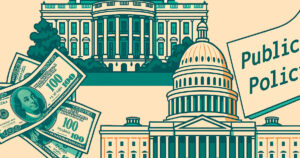On April 2, 2025, President Donald Trump announced sweeping new tariffs, dubbed the “Liberation Day” tariffs. These include a 10% baseline tariff on all imports, alongside steep “reciprocal tariffs” targeting specific countries—such as a 34% tariff on Chinese goods and 20% on European Union products. The stated goal: to boost domestic manufacturing and address longstanding trade imbalances.
But behind the headlines, a familiar story is unfolding in Washington: lobbyists are racing to shape the outcome.
Corporate Influence and Trade Policy
In the days following the announcement, lobbying firms across K Street began crafting exemption requests and policy briefs for their clients. Industries with deep lobbying budgets—like tech, pharma, and defense—moved quickly to shield themselves from the fallout.
This is not unusual. While trade policy is meant to serve the national interest, it is often shaped behind closed doors, influenced heavily by corporations and industry groups with the most access and money.
Research shows that U.S. trade decisions are significantly influenced by corporate lobbying, with trade associations and large firms frequently pushing for policies that benefit their bottom line—even if they come at the expense of small businesses, workers, or consumers.
Tariffs and Small Business: An Uneven Playing Field
Large corporations often have entire teams devoted to lobbying and regulatory navigation. Small businesses do not. As a result, they’re more likely to bear the brunt of sudden tariff hikes—paying higher costs for imported goods without the leverage to secure carve-outs or subsidies.
The “Liberation Day” tariffs are expected to increase prices across multiple sectors, squeezing small retailers, manufacturers, and agricultural producers. For many, it’s yet another example of how political decisions—heavily influenced by big money—create a lopsided economic landscape.
When Policy Becomes Pay-to-Play
Tariffs are one example of how money in politics distorts policy outcomes. When corporate lobbyists dominate the conversation, trade measures can become tools of self-interest rather than instruments of national strategy. This can lead to:
- Market distortions favoring entrenched players
- Retaliatory tariffs from global partners
- Higher costs for everyday consumers
- Erosion of public trust in government decisions
This pattern is not limited to trade. Across health care, defense, agriculture, and tech, powerful industries spend billions lobbying for favorable treatment—and often succeed.
The Money Out of Politics Movement: Calling for Transparency and Integrity
The Money Out of Politics (MOP) Movement believes that policy should reflect the will and welfare of the people—not the power of corporate checkbooks.
That’s why we’re calling for:
- A ban on lobbyist gifts to elected officials
- An end to congressional stock trading
- The overturning of Citizens United to reinstate campaign finance limits
- A constitutional amendment to end the financial corruption of American democracy
Tariff policy might seem technical, but it’s deeply political—and profoundly influenced by money. We believe it’s time to demand transparency, level the playing field, and ensure that economic decisions serve the many, not the few. Join the movement to demand change today.


